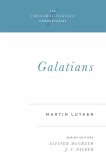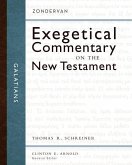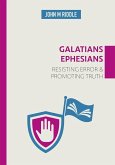Commentary on Galatians (1535) stands as Martin Luther's most comprehensive exposition of his doctrine of justification by faith alone, drawing from his earlier lectures and writings to present a thorough analysis of Paul's epistle. This influential work represents not only Luther's mature theological thinking but also his pastoral concern for Christians struggling with questions of salvation and assurance. We have updated this timeless classic into a modern, updated English translation so you can understand exactly what Luther wrote hundreds of years ago. At its heart, the commentary expounds Luther's central insight that righteousness comes through faith in Christ alone, not through works of the law. Through careful exposition of Galatians, Luther develops his understanding of law and gospel, Christian liberty, and the nature of justifying faith. The work is particularly notable for its sharp distinction between law and gospel, its emphasis on the believer's union with Christ, and its critique of what Luther saw as works-righteousness in medieval Catholic teaching. What distinguishes this work is Luther's ability to combine scholarly exegesis with passionate pastoral application. While engaging with the biblical text in detail, he consistently relates Paul's message to the spiritual struggles of his readers. His vivid writing style, personal illustrations, and forceful arguments make complex theological concepts accessible while maintaining their profound implications. The commentary is especially valuable for its treatment of Christian freedom and the proper role of good works in the Christian life. The influence of Luther's Commentary on Galatians extended far beyond its immediate context, shaping Protestant understanding of justification and Christian liberty for generations. Its emphasis on the sufficiency of faith in Christ and the freedom of the Christian conscience continues to resonate with readers seeking assurance of salvation and understanding of Christian living.About the AuthorMartin Luther (1483-1546) was the primary catalyst of the Protestant Reformation, whose rediscovery of justification by faith transformed Western Christianity. Writing this commentary during his mature years at Wittenberg, Luther drew on decades of biblical study, theological reflection, and pastoral experience. His combination of scholarly depth, theological insight, and pastoral wisdom made this commentary one of his most beloved and influential works. While he wrote extensively on many biblical books, his Commentary on Galatians remains particularly significant for its clear articulation of Protestant soteriology and its practical application of Reformation principles.
Hinweis: Dieser Artikel kann nur an eine deutsche Lieferadresse ausgeliefert werden.
Hinweis: Dieser Artikel kann nur an eine deutsche Lieferadresse ausgeliefert werden.








